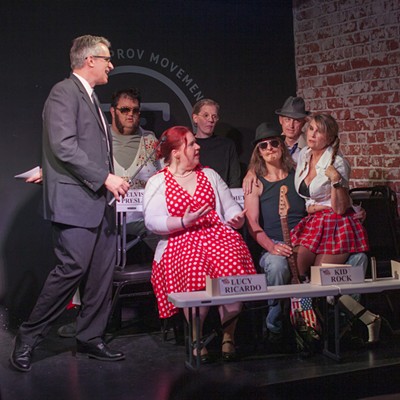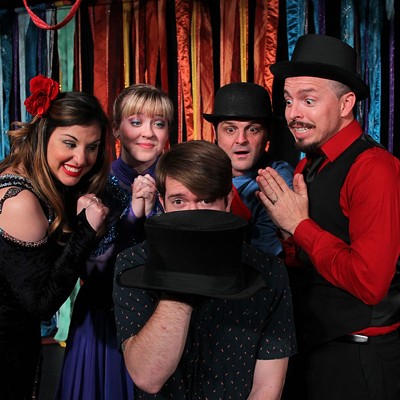If you know nothing about Florence Foster Jenkins, the New York socialite who fancied herself a world-class soprano and became a hot ticket despite a complete lack of singing ability, you need to know this:
She happened.
Watching her delicious story play out in Souvenir, now onstage at Live Theatre Workshop, you might wonder whether playwright Stephen Temperley pumped up the narrative with juicy exaggeration.
But you don't have to take the playwright's word that FFJ was the worst opera singer ever to achieve fame. Do a quick YouTube search and you'll find recordings from the 1930s and '40s that prove the glorious truth: This woman's singing was in fact, horrendous. Hearing her massacre the classics, you can hardly disagree with the critic who said her singing "sounded like a turkey being gang-raped."
To the extent that she could carry a tune, she carried it right off the rails into a chasm of jaw-dropping ineptitude that left audiences breathless and gasping for more (or less). By the time she played Carnegie Hall in 1944, in-the-know fans paid good money to bask in her badness. The famed concert hall was packed for the recital and more than 2,000 were turned away.
Today, of course, we are accustomed to untalented types becoming monstrously famous for no good reason. So-called reality television has made instant celebrities of cat-fighting housewives, empty-headed bachelors and bachelorettes, various and sundry Kardashians and an assortment of tanned creatures from the Jersey Shore.
But several decades before there was a Snooki, there was a Florence Foster Jenkins, a woman whose sustained, spectacular wrongness was ahead of her time. From our perspective, it's tempting to think that the wealthy "coloratura" from Wilkes-Barre, Pa., was in fact a performance artist of the first rank—the Stephen Colbert of her day.
Surely she could hear audiences laughing at her or trying not to by shoving handkerchiefs in their mouths. Could it be that she was smarter than those who lavished her with derision?
By all accounts, the answer is no.
Unlike Colbert, who is the very model of a modern major performance artist, she was not in on the joke. And the tension that helps drive Souvenir comes from hoping against hope that her bubble of joy will not be shattered by the truth. Self-awareness, after all, ain't all it's cracked up to be.
At Live Theatre Workshop, the would-be soprano is played by Carlisle Ellis, a reliable Tucson actor whose performances have often required a walk on the high wire.
Under the sure-handed direction of Stephen Frankenfield, Ellis brings unbridled and infectious joy to the role. Her enthusiastic shrieking—in service of "Mr. Mozart" (her absolute fave) and other masters, from Verdi to Brahms—hits comedic pay dirt, but there's a wounded soul and a genuine music lover underneath it all.
You'll remember the singing or whatever you call the sound that escapes from her mouth. But you'll also remember the haunted, lost look in her eyes.
You'll also remember Michael Martinez, who plays Cosme McMoon, the pianist who accompanied the dowager on her rocket ride to unlikely fame. As McMoon, who narrates the fantastic tale, Martinez wields a look of slow-building horror that brought down the house more than once on opening night.
Martinez proves himself to be an understated actor who makes the most of listening. And his reactions, which include the best slow burn this side of Jack Benny, never veer into playing-for-laughs territory.
You might wonder if this character is also based in truth, and indeed the real-life McMoon was an honest-to-goodness triple threat, a prodigy who played, sang and wrote with all the perfection that Jenkins lacked. If anything, the play downplays his accomplishments. The accompanist was also an amateur bodybuilder and master chess player.
Foster was known for plentiful costume changes that became a touchstone of her recitals, and designer Stephanie Frankenfield proved up to the task, creating a succession of splendid outfits. Richard Gremel's lighting and set design are also effective.
Souvenir was produced on Broadway in 2005 and at Arizona Theatre Company in 2007, with Judy Kaye in the starring role. If the ending at LTW lacks the knockout punch delivered by Kaye, the Phoenix native who re-created her Tony Award-nominated performance at ATC, it's only because the final song is not well-suited for Ellis, an actor not known for her musical-theater work. Still, the idea behind the finale is so perfectly conceived that it feels peevish to note that Ellis did not hit it out of the park.
It is, after all, the music in one's head that remains paramount.
It's worth recalling that this woman's unexamined life was not merely the stuff of folly. Her annual concerts at the Ritz Carlton, where she lived and actually practiced for hours on end, raised thousands of dollars for charity.
Souvenir ends up as a touching celebration of what Florence Foster Jenkins brought to the table.
"Some people said I couldn't sing," she once said. "But no one can say that I didn't sing."










